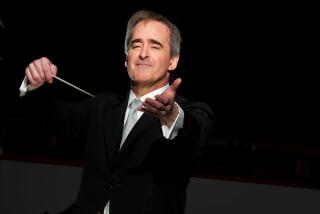Cesare Siepi dies at 87; Italian bass singer known for roles as Don Giovanni, Figaro
Cesare Siepi, the celebrated Italian bass singer who won over audiences worldwide in signature roles such as Don Giovanni and Figaro in “The Marriage of Figaro,” has died. He was 87.
The opera singer died Monday at Piedmont Hospital in Atlanta, said his wife, Louellen. He had suffered a stroke about 10 days ago, she said.
Known for his warm and direct performance style, Siepi was a beloved staple at the Metropolitan Opera for almost 25 years, appearing in nearly 500 performances with the company. In addition, he was a regular at Covent Garden in London and the Vienna State Opera.
Siepi performed nearly all the major bass roles in the contemporary operatic repertoire. His interpretation of Mozart’s rakish Don Giovanni was widely praised for its charm, wit and seductive power. His other signature roles included Philip II in “Don Carlo,” Mephistopheles in “Faust” and Basilio in “The Barber of Seville.”
“I think he was one of the greatest basses of his time, if not the greatest,” Martin Bernheimer, The Times’ music critic from 1965 to 1996, said Monday.
“He was never content just to sing, he created a character.”
Siepi sang at a 1986 recital at UCLA where he performed pieces by Schubert, Schumann, Brahms and others.
“He sings, easily and tastefully, with a type of voice that has virtually become extinct. He is a true basso,” wrote Bernheimer in a review. “The tone is dark, smooth, rich, even, mellow. The production is steady. The range seems bottomless.”
Born Feb. 10, 1923, in Milan, Siepi was believed to be largely self-taught, though he reportedly spent time at the music conservatory in Milan. He made his debut in 1941 as Sparafucile in “Rigoletto” in Schio, Italy. During World War II, he fled to Switzerland because of his anti-fascist views, but returned to his homeland after the war to resume his operatic career.
During the late 1940s, he performed regularly at La Scala in Milan, where he sang in productions of “Aida,” “Nabucco” and others. His association with La Scala would last his entire career.
Siepi’s international career took off in 1950 when Rudolf Bing, the general manager of the Met, brought him to New York to perform in “Don Carlo.” After that, there was hardly a season when he didn’t perform with the company either at its home in New York or on tour.
In 1954, he made his debut with the San Francisco Opera as Padre Guardiano in “La Forza del Destino.”
Siepi’s repertoire encompassed Italian and German opera. His voice was described as a basso cantante, which means a “singing bass” with a higher range than other basses.
A prolific recording artist, Siepi made albums with Naxos, Decca and other major labels. His albums weren’t confined to the operatic repertoire. In one album, he sang show tunes by Cole Porter, including selections from “Kiss Me Kate,” “Anything Goes” and other shows and films.
Siepi also made two forays onto the Broadway stage, performing in the musicals “Bravo Giovanni” in 1962 and “Carmelina” in 1979. The latter was a flop that closed after just 17 regular performances.
Siepi continued to perform on stage well into his 60s, and he retired in 1989.
Mark Swed, The Times’ music critic, said Monday that Siepi possessed “a rich, warm voice” and that he was “an interpreter of great eloquence.”
“He was far too classy to steal the show. Instead he often simply was the show,” Swed said.
The singer married Louellen Sibley, a dancer who has performed at the Met.
In addition to his wife, Siepi’s survivors include his daughter, Luisa, his son, Marco, and two grandchildren.
More to Read
Start your day right
Sign up for Essential California for the L.A. Times biggest news, features and recommendations in your inbox six days a week.
You may occasionally receive promotional content from the Los Angeles Times.







